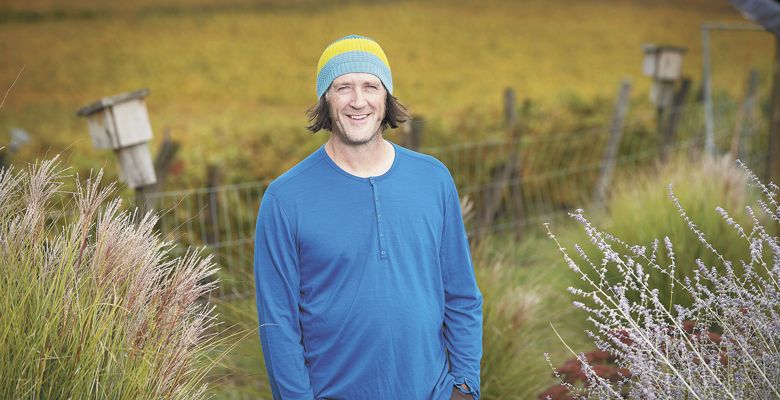The Changeup: Muscat Love
Chris Williams dedicated to aromatic white
When’s the last time someone yelled out “Muscat” when asked to name a favorite wine? Exactly. It happens with the same frequency as presidential press conferences. Christopher Williams of Brooks Wine hopes to change that* with his Terue Dry Muscat.
It seems odd that Williams, a winemaker known for Pinot Noir and Riesling, would bother tackling Muscat. First, it’s a confusing grape, with as many varieties — more than 200 — as there are Kardashians. Second, people frequently associate Muscat with sweet wines like Moscato d’Asti, a.k.a. “Sprite for adults.” Williams offers a candid answer: “I love a challenge.”
He continues, “Muscat has this bad rap. It’s kind of like Riesling: People think it’s going to be a certain way, so they don’t give it a chance.” Williams is eager to show naysayers how Muscat can be a serious dry wine and can age gracefully for a decade or more.
He fancies Muscat so much he heretically confesses the wine stands as his second favorite grape, behind Riesling, but ahead of Pinot Noir. “Muscat is the truest grape from vineyard to glass,” he explains. “If I’m standing in the middle of a block of Muscat three weeks before harvest, its floral scents fill the air. Several months later, I get those exact same smells when I pour the wine into my glass. No other varietal takes it to that level.”
Williams’ devotion to Muscat has not gone unnoticed at the winery. Claire Jarreau, his assistant, told me, “Chris very clearly loves varietals with high concentrations of terpenes; hence, our foray at Brooks into nearly every aromatic white we can find a source for.” Equipped with that knowledge, I ask Williams if he ever met an aromatic white wine grape he didn’t like. “Yeah,” he answers with a wry grin, “Chardonnay.”
The terpenes Jarreau references is a set of organic compounds found in grapes. Muscat is jam-packed with two in particular: geraniol and linalool. These compounds give the wine its trademark spicy flower-power.
Williams’ work with Muscat began almost 20 years ago with his friend and predecessor, the late Jimi Brooks. He was assisting Brooks when he created a blend they called Amycas. With a couple of vintages of this pretty white produced, Brooks and Williams were offered the opportunity to buy Muscat grapes from a nearby vineyard, which they added to the Amycas blend to see how they’d play off the Gewürztraminer. This was the moment Williams fell for Muscat’s aromatic charms.
Those inspiring grapes came from Eola Springs Vineyard near Rickreall. When the owners decided to tear it all out a few years ago, Williams convinced them to save him one acre of the most mature block — nearly 40 years old. I do believe he would have thrown himself in front of their tractors had they ignored his plea.
In 2008, Williams began using the Early Muscat from Eola Springs to make Terue. These days, the wine is a 50-50 blend of that same Early Muscat (a cross between Muscat Hamburg and Skolokertek Kiralynoje) and Orange Muscat (a cross between Muscat Blanc à Petit Grains and Chasselas) from Muska Vineyard, a hillside neighbor of Brooks in Amity.
The Terue’s quality matches the passion of its maker. Find some before it disappears.
*Williams hopes Terue will change people’s perception of Muscat. It probably won’t alter the frequency at which the president holds White House press conferences. Probably.
Terue 2016 Dry Muscat, Eola-Amity Hills ($18)

Terue appears a pale gold color, but it’s the label that catches my eye. The silkscreen print by Hideo Kato enamored Williams during a 2007 sales trip to Kyoto, Japan. Red and white plum blossoms sway in the wind, backed by a mesmerizing wood grain pattern. The striking image makes locating the bottle on Brooks’ tasting room shelves an easy task. The name of the artwork is “Fuga,” or “Elegance,” a perfect description for Terue.
The name is another byproduct of Williams’ trip to Japan. Terue is the woman who, along with husband Yoshi Akiyama, owns Bar Switch in Tokyo. My understanding is the couple sells a lot of Oregon wine. Her name is pronounced tear-ooh-way. I finally nail the pronunciation after Williams coaches me while laughing at my attempts.
I can smell the wine 10 feet away. Floral notes of gardenia, orange blossoms and fresh thyme fill the air. As I step closer to the source, I sense stone fruit, mint and spicy cinnamon brioche. Then, with my nose firmly in the glass, I am surprised by a clean, crisp, citrusy note smelling like an icy granita, highly appreciated on a hot summer day.
As the wine passes my lips, it equally captivates. White grapefruit and peach skin flavors wrap themselves like a tart ball around a core of orange preserves. Herbal flavors, like lemon verbena, linger in the background. The super-long finish shows a bit of nuttiness and a stony/talc quality reminiscent of a recently dried sidewalk.
Finally, the wine’s texture: At 13.5 percent alcohol, Terue fills the mouth with its dry, concentrated flavors while ripping levels of acidity act like a counter-balance on a teeter-totter. If you enjoy acidity, Terue will make you howl like a graveyard hound.



 Michael Alberty is a wine writer based in Tualatin. He prefers writing about wine over past efforts writing about international environmental politics and major league baseball — because you can’t drink a baseball game and no one has ever professed their undying love to another human after reading about the Montreal Protocol. Michael’s work has appeared in Edible Portland, Willamette Week, Sprudge Wine, Terre Magazine, Wine & Spirits Magazine, The Octopus and on Jancis Robinson’s “Purple Pages” website. He also edits the Oregon section of the annual Slow Wine Guide and covers wine for The Oregonian.
Michael Alberty is a wine writer based in Tualatin. He prefers writing about wine over past efforts writing about international environmental politics and major league baseball — because you can’t drink a baseball game and no one has ever professed their undying love to another human after reading about the Montreal Protocol. Michael’s work has appeared in Edible Portland, Willamette Week, Sprudge Wine, Terre Magazine, Wine & Spirits Magazine, The Octopus and on Jancis Robinson’s “Purple Pages” website. He also edits the Oregon section of the annual Slow Wine Guide and covers wine for The Oregonian. 







